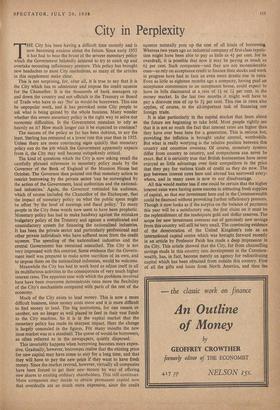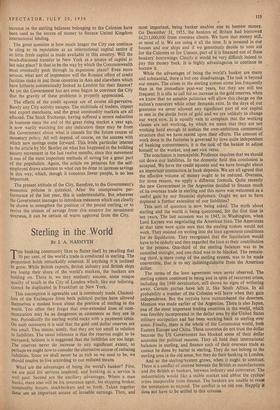T HE City has been having a difficult time recently and
is now becoming anxious about the future. Since early 1955 it has had to bear the brunt of the severer monetary policy which the Government belatedly initiated to try to catch up and overtake mounting inflationary pressure. This policy has brought new headaches to most City institutions, as many of the articles in this supplement make clear.
This is not surprising, for, after all, it is true to say that it is the City which has to administer and impose the credit squeeze for the Chancellor. It is the thousands of bank managers up and down the country and not officials in the Treasury or Board of Trade who have to say 'No' to would-be borrowers. This can be unpopular work, and it has provoked some City people to ask what is being gained by the whole business. Many wonder whether this severe monetary policy is the right way to solve our economic difficulties. Is the Government mistaken to rely so heavily on it? How much longer can it be expected to continue?
The success of the policy so far has been dubious, to say the least. Sterling has remained at a lower rate this year than in 1955. Unless there are more convincing signs quickly that monetary policy can do the job which the Government apparently expects from it, the City may well become outspokenly critical.
squeeze naturally puts up the cost of all kinds of borrowing. Whereas two years ago an industrial company of first-class reputa- tion might have been able to pay as little as 4+ per cent, for its overdraft, it is possible that now it may be paying as much as 61 per cent. Such companies—and they are not inconsiderable ones—as rely on acceptance credit to finance their stocks and work in progress have had to face an even more drastic rise in rates. Even as little as eighteen months ago a company, having paid an acceptance commission to an acceptance house, could expect to have its bills discounted at a rate of 11 or l per cent, in the money market. In the last two months it might well have to pay a discount rate of up to 51 per cent. This rise in rates also applies, of course, to the all-important task of financing our foreign trade.
It is also particularly in the capital market that fears about the future are beginning to take hold. Most people rightly see that it is not so much the fact that interest rates are higher than they have ever been here for a generation. This is serious but, providing the inflation is brought under control, worthwhile. But what is really worrying is the relative position between this country and countries overseas. Of course, monetary systems differ from country to country, and comparisons can never be exact. But it is certainly true that British businessmen have never enjoyed so little advantage over their competitors in the price that they pay for various kinds of credit as they do now. The gap between interest rates here and abroad has narrowed every- where, and in many cases is now to our disadvantage. increase in the sterling balances belonging to the Colonies have been used as the source of money to finance United Kingdom international lending.
The great question is how much longer the City can continue to cling to its reputation as an international capital centre if so little fresh capital is made available in this country. Will the much-discussed transfer to New York as .a source of capital at last take place? Is that to be the way by which the Commonwealth must eventually push through its expansion plans? Even more serious, what sort of impression will the Russian offers of credit facilities make in just those countries in Asia and elsewhere which have hitherto automatically looked to London for their finance? As yet the Government has not even begun to convince the City that the gravity of these problems is properly appreciated.
The effects of the credit squeeze arc of course all-pervasive. Barely any City activity escapes. The multitude of traders, import and export merchants, and the great commodity markets are all affected. The Stock Exchange, having suffered a severe reduction in business since the end of the great rising market a year ago, is now warily watching for any indication there may be from the Government about what it intends for the future course of monetary policy. All will depend, of course, on the success with which new savings come forward. This lends particular interest to the article by Mr. Bentley on what has happened in the building society movement in the last twelve months, since this movement is one of the most important methods of saving for a great part of the population. Again, the article on pensions for the self- employed draws attention to what can be done to increase savings in this way, which, though it concerns fewer people, is no less important.
The present attitude of the City, therefore, to the Government's economic policies is quizzical. After the unimpressive per- formance of the last year, this is understandable. But wherever the Government manages to introduce measures which can clearly be shown to strengthen the position of the pound sterling, or to revive the stream of savings from this country for investment overseas, it can be certain of warm approval from the City.



















































 Previous page
Previous page